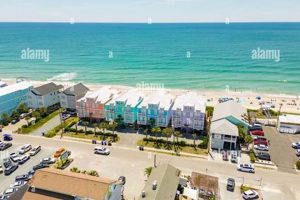The phrase identifies a specific sector of the real estate market: properties available for temporary occupancy in a coastal town within North Carolina. This segment typically encompasses houses, condominiums, and apartments offered to tourists and other short-term visitors seeking lodging in Surf City.
Availability of accommodations significantly impacts the local economy, supporting tourism and related industries. Historical context reveals a shift from primarily residential housing to a blend of permanent residents and seasonal vacationers, driving the demand for specialized property management and rental services.
Subsequent sections will explore the types of properties available, seasonal pricing fluctuations, regulations impacting the rental market, and factors to consider when selecting appropriate accommodation.
Selecting appropriate temporary housing requires careful consideration of several factors. This guide provides key points to facilitate informed decision-making regarding accommodations.
Tip 1: Advance Booking: Securing accommodations well in advance, particularly during peak seasons, is strongly recommended. Early reservations increase the probability of finding desired properties and may result in more favorable pricing.
Tip 2: Define Accommodation Needs: Determine required space, amenities, and location relative to desired activities. Consider factors such as the number of occupants, parking requirements, and proximity to the beach or town center.
Tip 3: Scrutinize Property Descriptions: Carefully review descriptions and photographs of listed properties. Verify the accuracy of stated amenities, bedding configurations, and square footage to avoid potential discrepancies upon arrival.
Tip 4: Review Lease Agreements: Understand the terms and conditions of the rental agreement, including cancellation policies, security deposit requirements, and restrictions on property use. Clarify any ambiguities before finalizing the reservation.
Tip 5: Evaluate Property Management: Research the reputation and responsiveness of the property management company or individual owner. Positive reviews and prompt communication are indicators of reliable service.
Tip 6: Understand Seasonal Pricing: Rental rates fluctuate considerably based on the time of year. Expect higher prices during summer months and holidays, with lower rates typically available during the off-season.
Tip 7: Confirm Pet Policies: If traveling with pets, verify the property’s pet policy, including size and breed restrictions, associated fees, and designated pet areas.
Thorough preparation and diligent research are essential for a satisfactory accommodation experience. By adhering to these guidelines, individuals can minimize potential issues and enhance their stay.
The subsequent section addresses the legal and regulatory landscape governing short-term rentals, ensuring compliance and promoting responsible tourism.
1. Availability
Availability, in the context of accommodations, is a primary determinant of options and cost. Its impact extends from the individual renters ability to secure desired lodging to the broader economic health of Surf City’s tourism sector. The level of options significantly defines the customer experience and shapes the market landscape.
- Seasonal Fluctuations and its Impact on Options
Availability is highly sensitive to seasonal trends. Summer months experience peak demand, leading to reduced property choices and increased rates. Conversely, the off-season provides wider selection and more budget-friendly opportunities. This seasonality demands strategic planning for both renters and property managers, influencing when and how rentals are marketed and booked.
- Property Type and its Influence on Listings
The mix of property typessingle-family homes, condominiums, apartmentsaffects the range of listings. Larger homes cater to families or groups, while smaller units are suited for couples or solo travelers. The balance of these types impacts the likelihood of finding an appropriate match for specific needs. Limited availability of a particular type (e.g., pet-friendly units) can restrict options.
- Advance Booking and Securing a Stay
Availability is directly linked to booking lead time. Properties booked months in advance offer greater assurance of securing desired dates and features. Procrastination can lead to limited or non-existent choices, especially during high-demand periods. This dynamic reinforces the value of proactive planning and early reservations.
- Management Practices and Property Status
Properties under professional management might display higher availability rates due to efficient turnover and marketing strategies. Properties managed directly by owners might have more restricted availability depending on their personal use and scheduling constraints. The operational approach significantly impacts the frequency and consistency of the rental pool.
The interplay of seasonality, property type diversity, booking lead time, and operational management collectively defines the availability within Surf City. Understanding these interrelated dynamics is fundamental for optimizing the rental experience and strategically navigating the market.
2. Pricing
Pricing within the Surf City North Carolina rental market is a complex factor determined by supply and demand, seasonality, property attributes, and competitive pressures. It directly impacts consumer affordability and landlord profitability. For example, a three-bedroom beachfront home rented for $2,000 per week in July might command only $1,200 per week during October, reflecting the decreased demand outside the peak summer season. Understanding the dynamics shaping price is essential for both renters seeking value and property owners maximizing revenue.
Variations in property features also significantly influence rental rates. Residences with private pools, ocean views, or upgraded amenities (e.g., gourmet kitchens, modern entertainment systems) typically command premium prices. Location plays a vital role; properties closer to the beach or town center are generally priced higher than those situated further inland. Moreover, the presence of professional property management often translates to higher rates, reflecting the value of enhanced services such as cleaning, maintenance, and guest support. Regulatory factors, such as occupancy limits and taxes, also contribute to the overall cost borne by the renter.
In conclusion, pricing is a critical determinant of rental decisions. Accurate assessment of property characteristics, seasonal fluctuations, and competitive dynamics enables prospective tenants to make informed choices aligned with their budget and preferences. Property owners benefit from a comprehensive understanding of pricing strategies to ensure competitive positioning and optimal occupancy rates, contributing to the overall stability and growth of the rental market.
3. Location
The geographic positioning of rental properties within Surf City significantly influences demand, pricing, and overall desirability. Proximity to the beachfront is a primary driver of value, with oceanfront properties commanding premium rates due to unobstructed views and immediate beach access. Residences situated closer to the town center, with its concentration of restaurants, shops, and entertainment venues, also exhibit elevated rental potential. Conversely, properties located further inland or in less desirable areas may experience reduced occupancy rates and lower rental income. The specific positioning influences the type of renter a property attracts; for example, beachfront properties may appeal more to families seeking a beach vacation, while properties near the town center attract individuals interested in nightlife and dining. Properties within a specific walking distance to the beach will cause higher demand.
Access to local amenities and attractions also shapes rental appeal. Properties within walking distance of the Surf City Pier or public beach access points are generally more sought after than those requiring vehicular transport. Conversely, properties situated near noisy areas or those experiencing heavy traffic flow may suffer reduced desirability. The immediate surroundings and neighborhood characteristics play a vital role in shaping the perception of value. Properties offering convenient access to boat ramps, fishing spots, or other recreational opportunities cater to specific niche markets and may command higher prices. A residence 20 mins away will cause less demand.
Understanding the interplay between location and rental appeal is essential for both property owners and prospective renters. Landlords must carefully consider property positioning when determining rental rates and marketing strategies. Renters should evaluate location in relation to their specific needs and preferences, weighing factors such as proximity to amenities, noise levels, and overall neighborhood quality. Ultimately, strategic consideration of location is paramount to maximizing rental potential and ensuring a satisfactory occupancy experience.
4. Amenities
The range and quality of amenities within properties offered as short-term lodging in Surf City significantly influence rental rates and occupancy. The availability of features such as fully equipped kitchens, private balconies, and in-unit laundry facilities directly impacts renter perception of value. For instance, a condominium without a dedicated washer and dryer might face difficulty competing with a similar unit offering this amenity, potentially resulting in a lower rental price or extended vacancy. The amenities offered serve as key differentiators in a competitive marketplace, affecting demand and renter satisfaction.
Specific amenities cater to distinct renter demographics. Properties targeting families may emphasize features such as cribs, high chairs, and child-safe environments. Those targeting couples might focus on amenities such as hot tubs, fireplaces, and ocean views. The strategic selection and marketing of amenities aligned with target demographics can significantly enhance a property’s appeal. Furthermore, access to community amenities, such as swimming pools, fitness centers, and private beach access, can further enhance a rental property’s value. The absence of sought-after amenities, conversely, can limit a property’s marketability and necessitate price adjustments.
The integration of valued services also influences market. Access to a smart TV with Streaming Service, or a high-speed internet can attract more renters. Considering this correlation contributes to enhanced insights for prospective tenants. The provision of desirable amenities increases customer satisfaction, leading to positive reviews, repeat bookings, and enhanced property reputation. Therefore, both property owners and managers should carefully consider the impact of amenities on renter expectations and adjust their offerings accordingly to optimize rental performance and cultivate positive customer experiences.
5. Regulations
Regulations directly impact the operation and profitability of temporary lodging in Surf City, North Carolina. Compliance with local ordinances and state laws is essential for both property owners and rental agencies to ensure lawful operation and avoid penalties. Understanding the regulatory landscape is crucial for maintaining a sustainable and responsible rental market.
- Zoning Ordinances and Permitted Use
Zoning regulations dictate where short-term rentals are permitted within Surf City. Certain residential zones may prohibit or restrict the operation of rental properties, requiring property owners to obtain special permits or conditional use approvals. Non-compliance can result in fines, legal action, and the forced closure of rental operations. The definition of “short-term” can vary and affects whether property qualifies.
- Occupancy Limits and Safety Standards
Local ordinances often establish maximum occupancy limits for rental properties, aiming to prevent overcrowding and maintain safety standards. Regulations may also mandate specific safety features, such as smoke detectors, carbon monoxide detectors, and fire extinguishers. Adherence to these regulations is critical for ensuring the safety of renters and avoiding liability in the event of an emergency. These standards are enforced to protect renters.
- Rental Taxes and Licensing Requirements
Property owners engaged in the short-term rental market are typically required to collect and remit state and local sales taxes on rental income. Additionally, they may be subject to licensing or registration requirements, which involve paying fees and providing proof of compliance with safety and zoning regulations. Failure to comply with tax and licensing requirements can result in penalties, interest charges, and legal repercussions.
- Noise Ordinances and Community Impact
Surf City, like many coastal communities, has noise ordinances designed to minimize disturbances to residents. Rental property owners are responsible for ensuring that their guests comply with these regulations, particularly during nighttime hours. Excessive noise can lead to complaints from neighbors and potential fines for both renters and property owners. Compliance is essential for maintaining positive community relations and avoiding conflicts.
These regulatory components collectively shape the operational landscape for temporary rentals in Surf City. Proactive compliance is not only a legal imperative but also a crucial element of responsible property management, fostering a harmonious balance between tourism and community well-being.
6. Seasonality
Seasonality is a primary driver impacting the demand, pricing, and availability of accommodations. The cyclical nature of tourism directly influences the performance of rentals, creating distinct periods of high and low activity. Understanding the dynamics of seasonal fluctuations is essential for property owners and renters alike.
- Peak Season Demand and Rate Surge
Summer months, particularly June through August, represent the peak season due to favorable weather and school holidays. This period experiences the highest demand, resulting in increased occupancy rates and significantly elevated rental prices. Properties may command premium rates during this time, reflecting the limited availability and heightened demand from vacationers.
- Off-Season Declines and Reduced Rates
Conversely, the off-season, typically spanning from late fall to early spring, witnesses a sharp decline in tourism. Demand for rentals diminishes substantially, leading to lower occupancy rates and decreased rental prices. Property owners often offer discounted rates during this period to attract renters seeking budget-friendly accommodations.
- Shoulder Season Opportunities and Moderate Pricing
The shoulder seasons, occurring in spring and fall, represent transitional periods characterized by moderate demand and pricing. These seasons offer a balance between affordability and pleasant weather conditions, attracting renters seeking a less crowded and more economical vacation experience. Property owners may adjust rates to reflect the intermediate demand levels.
- Event-Driven Demand Spikes and Variable Rates
Specific events, such as holidays, festivals, or sporting competitions, can generate localized and temporary surges in demand. Rental rates may fluctuate in response to these events, particularly for properties located near event venues. Understanding the local event calendar is essential for both property owners seeking to optimize revenue and renters seeking to secure accommodations during these periods.
These seasonal variations underscore the dynamic nature of rentals. Strategic adaptation to these cycles through effective pricing strategies, marketing efforts, and property management practices is essential for maximizing revenue potential and ensuring long-term success within the industry.
7. Management
Effective management is critical to the success and sustainability of rental properties. Its influence permeates various aspects, from pricing strategies and marketing initiatives to tenant relations and property maintenance. Competent oversight is essential for optimizing revenue generation and ensuring a positive customer experience.
- Property Maintenance and Upkeep
Consistent property maintenance is essential for preserving value and attracting renters. Management entails regular inspections, prompt repairs, and preventative maintenance to address issues before they escalate. Neglecting maintenance can lead to decreased property value, negative renter reviews, and difficulty securing future bookings. A proactive management approach ensures properties remain in optimal condition.
- Tenant Screening and Relations
Thorough tenant screening procedures are crucial for minimizing risks associated with property damage, lease violations, and non-payment of rent. Management includes conducting background checks, verifying income, and contacting references to assess the suitability of prospective tenants. Maintaining positive tenant relations through responsive communication, fair treatment, and timely resolution of concerns enhances renter satisfaction and promotes lease renewals.
- Marketing and Pricing Strategies
Effective marketing is essential for maximizing occupancy rates and rental income. Management involves developing comprehensive marketing plans that utilize online listing platforms, social media, and targeted advertising to reach prospective renters. Implementing dynamic pricing strategies based on seasonality, demand, and competitor analysis optimizes revenue generation while remaining competitive within the Surf City rental market.
- Legal Compliance and Regulatory Adherence
Adhering to all applicable local, state, and federal regulations is paramount for avoiding legal issues and maintaining operational legitimacy. Management includes staying informed about zoning ordinances, safety standards, rental tax requirements, and fair housing laws. Proactive compliance ensures the protection of both property owners and renters, fostering a responsible rental environment.
The various facets of management collectively contribute to the overall success and sustainability of accommodations. Effective management practices are essential for maximizing profitability, mitigating risks, and ensuring a positive experience for both owners and renters, thereby strengthening the reputation and viability of the local rental market.
Frequently Asked Questions About Surf City North Carolina Rentals
This section addresses common inquiries regarding temporary lodging, providing clarity on regulations, amenities, and seasonal trends.
Question 1: Are there restrictions on the duration of temporary lodging agreements?
Yes, local ordinances may specify minimum or maximum rental periods. It is essential to review the specific regulations to ensure compliance.
Question 2: How are disputes between landlords and tenants typically resolved?
Disputes are generally addressed through mediation or, if necessary, legal action. Lease agreements should outline procedures for resolving conflicts.
Question 3: Are properties required to provide specific safety features?
Properties are mandated to have functional smoke detectors and carbon monoxide detectors. Compliance with local safety standards is required.
Question 4: What is the typical range of security deposit amounts?
Security deposit amounts vary but are generally equivalent to one or two months’ rent. Lease agreements specify the terms for deposit refunds.
Question 5: How do seasonal fluctuations impact rental pricing?
Rental rates typically peak during the summer months, reflecting increased demand. Off-season rates are generally lower due to reduced tourist activity.
Question 6: Is insurance coverage required for properties?
Property owners are responsible for maintaining adequate insurance coverage. Renters may also consider obtaining renter’s insurance for personal belongings.
Understanding these facets contributes to successful navigation. Prospective tenants benefit from careful research, and property owners from transparent practices.
The subsequent section provides a concluding summary, reinforcing key points, and offering guidance.
Concluding Summary
The preceding analysis of Surf City North Carolina rentals elucidates the multifaceted nature of the accommodation market. Key determinants include seasonality, pricing dynamics, property amenities, location relevance, and regulatory compliance. These factors collectively shape the experiences of both property owners and prospective tenants within this specific geographical region.
Strategic awareness of market forces and adherence to established regulations are imperative for optimizing outcomes. Continued vigilance regarding evolving market trends and proactive adaptation to regulatory changes are essential for long-term success. The future viability of Surf City North Carolina rentals depends on responsible management, transparent practices, and a commitment to ensuring a positive experience for all stakeholders.


![Best Mini Golf Surf City Fun: [Your City] Guide! Learn to Surf & Skate: A Beginner's Step-by-Step Guide Best Mini Golf Surf City Fun: [Your City] Guide! | Learn to Surf & Skate: A Beginner's Step-by-Step Guide](https://universitysurfandskate.com/wp-content/uploads/2026/01/th-873-300x200.jpg)




